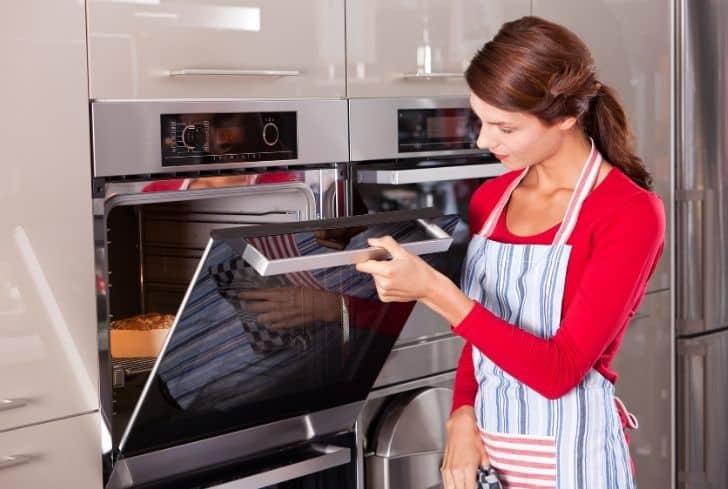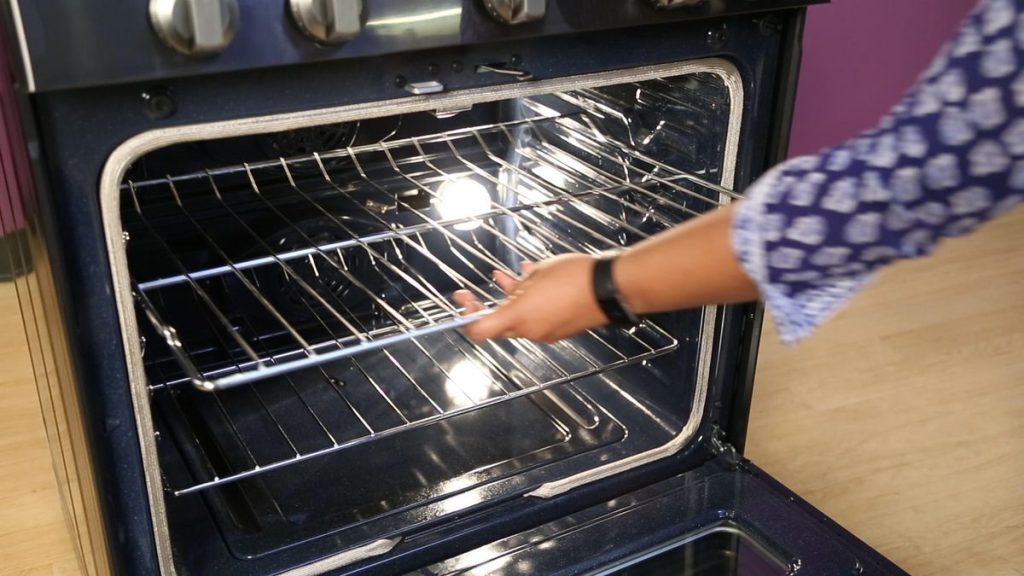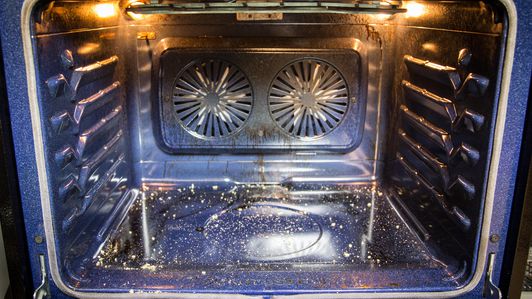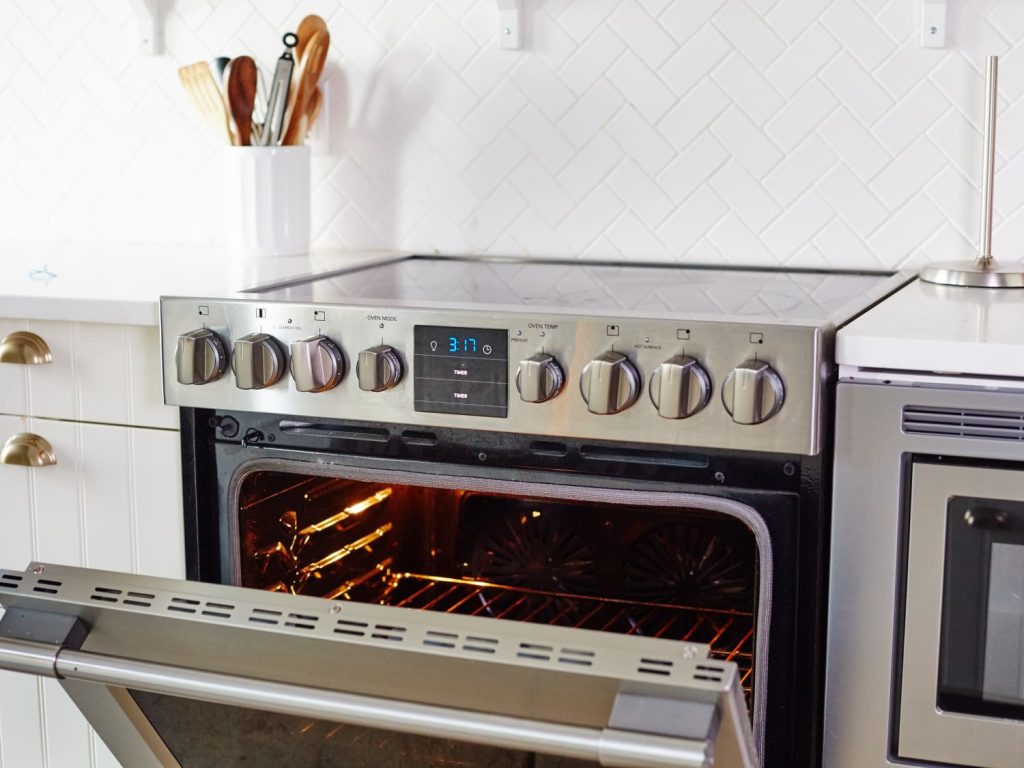Why does my oven have a burning plastic odour?

Don’t know what the last thing you want to smell while eating is is, but I’m quite sure the rotten stench of burnt plastic that some ovens may exude is towards the top of the list. Some have characterized the scent as “burning chemicals,” “burning rubber,” or “burnt plastic,” and I believe all of these descriptions are accurate.
So, what’s the deal with your oven smelling like burned plastic?
- The protective chemicals utilized throughout the production process are being burnt away.
- The oven’s insulation is subjected to tremendous heat for the first few occasions.
- Zip-ties used to fasten inserts in transportation have not been removed.
- Your oven is experiencing an electrical problem.
- There is faulty wiring, which may cause the insulation on the wires to melt.
- Strong chemicals were used to clean the oven.
During my time in the kitchen, this issue has come up a thousand times. The issue is that this does not only occur in ovens. It happens in almost all kitchen gadgets that heat up. The concept is that when the appliance is used for the first time, the chemicals should be burnt off instantly, but this isn’t always the case; sometimes, the user has to endure the stench several times before it fades. This is the source of the electric scent in your oven seven out of ten times. However, if your oven isn’t spanking new, there might be other factors at play.
What Is the Source of a New Oven’s Burning Plastic Odor?

It’s always preferable to get information from the source, usually the manufacturer.
According to what they say:
According to Samsung, the major and most common reason is “insulation surrounding the oven chamber producing scents the first few times it is exposed to the intense heat within the oven.” Bosch-website home’s says the same thing: “Chemical Smell. This is a common issue with newly purchased ovens. There is a chemical odor because the insulation around the oven chamber is being exposed to tremendous heat for the first time. To resolve this issue, you must “burn-in” your oven.” Here’s another note about freshly installed Kitchenaid ovens; “Odors, odors, and smoke are common, especially if the range or oven was just built.” The production procedure may produce an odor or smoke during the first few usages. This is normal and will dissipate. We all agree that this is a very typical issue with spanking new kitchen equipment. Still, It’s believed that they’re doing a mediocre job of mentioning another thing: the zip ties used to attach the inserts upon shipping must be removed before using the oven. Otherwise, when heated, these zip ties will begin to burn, emitting a scent identical to that of the chemical coating. However, this fragrance does not have to be limited to freshly installed ovens; it may also be detected when cooking in an old oven. You might assume it happened “out of nowhere,” but there’s a reason for it.
This might be the source of your oven smelling like burnt plastic out of nowhere:
- Strong chemicals were used to clean the oven.
- It should be shut off and inspected immediately if the oven is electric.
- You’re using an attachment that can’t handle the heat or one coated in oil during the production process and has to be burnt in.
- A faulty link. Examine where the heating element is linked and other connections, and secure them one at a time.
How Do you get the burning Plastic Smell Out of My Oven?
One of the most terrible scents is burnt plastic. It’s difficult to overlook since it’s unique and unlike other fragrances you encounter regularly. Aside from how bad the scent is, it spreads swiftly and
may quickly fill a house. It’s as if you were hit in the gut via your nose. Our primary goal is to get rid of it as soon as possible. To get rid of the odor of burnt plastic, you may need to repeat the method several times until it fades. There are several methods, and the techniques vary depending on whether your oven is brand new or has been used regularly before the smell appeared. New ovens must be burnt in, while old ovens must be cleaned. This is how you burn in your new oven to remove the chemical odor.
- Begin removing any zip-ties and other plastic pieces utilized during shipping when the oven is removed from the box.
- Once all of them have been taken from the oven, use a washcloth, soap, and warm water to clean the oven’s interior (including the racks).
- Now is the moment to burn in the oven, crank on the ventilation hood fan, and open surrounding windows.
- If possible, preheat the oven to 400-550 degrees Fahrenheit (204-288 Celsius).
- Allow the oven to run for 30 to 60 minutes after the temperature has been reached.
- Repeat the technique until the odor has subsided.
- Allow the oven to cool before wiping it down with warm water and a soap rag one last time.
Optional: If you have lemons on hand, I recommend pouring the juice from two lemons into an oven-safe dish, then adding water and baking at 230 degrees Fahrenheit for 30 minutes. The leftovers can then be used to clean the interior of the oven. This will certainly ensure that your new oven does not generate that unpleasant odor for an extended period.
Yet suppose your oven isn’t brand new and has previously been used a thousand times, implying that the protecting chemicals must have been burnt off a long time ago, but the same putrid stench has resurfaced. What should you do in the situation?
- What you’re encountering might be a recurring issue with that particular model. Because this might vary widely from instance to situation, I recommend contacting customer service. That way, you’ll be able to rule out whether or not you should be concerned.
You can proceed once an electrical fault has been ruled out.
- Using a washcloth, warm water, and soap, thoroughly clean the oven. Wipe off the whole interior of the oven, including the racks.
- Preheat an oven-safe dish with lemon juice and distilled vinegar.
- Preheat the oven to 230°F for 15-30 minutes.
- Remove the dish and re-heat the oven to 230°F for another 15-30 minutes, but this time with oven-dish holding water to neutralize the vinegar scent.
- Check the oven to check whether the burnt plastic smell has faded.
- If necessary, repeat.
Is Smelling Burning Plastic in a New Oven Dangerous?
We must first explain a few points; otherwise, the response will be “it depends.” Inhaling vapors from burning plastic is terrible, indeed. However, the scent that a new oven emits may not be from burning plastic but rather from the protective layer being burnt off. The smell of burnt plastic emanating from a new oven is thus not problematic unless the material is burning. Before using it, look over the user handbook for instructions. The instructions should include a warning about the likelihood of a weird odor emerging. It’s pretty standard and nothing to be concerned about with a new oven; This will happen the first few times you use it. Consider a scenario in which the odor and vapors you’re smelling are caused by plastic combustion. Indeed, it may be harmful to inhale them in such a situation. When plastic begins to melt and smoke, it emits fumes from the ingredients used to manufacture the plastic.
- Heavy metals derived from sulfur dioxide
- volatile organic substances
- Furans derived from hydrochloric acid
- Dioxins and carbon monoxide particles
According to Hunker.com, the stench can irritate your lungs and contain pollutants that can be hazardous to your health. If you own a bird, keep it away from any odors emanating from the kitchen since some of them may be fatal to our feathered companions. It is advised that you try your best to get rid of the vapors as soon as possible before concentrating on the scent. Toxins are carried by the fumes and should thus be eliminated first; The aroma may linger for a long period, but it may be eliminated in various methods. If you smell burnt plastic, open your windows, switch on ceiling fans, and make sure the air moves as soon as possible out of your home. Then, to get rid of the odor in your house, follow the steps outlined in the Hunker.com article linked above. It contains white vinegar, my go-to product for masking or neutralizing scents.
How Long Should a New Oven Take to Smell?
The new oven smell will usually decrease the first time the oven is “burned-in” and nearly entirely disappear, but it may take several attempts before the scent is gone. That being said, if you’re still getting the same noxious odor after your 20th attempt, there might be a problem with your oven. You should get in touch with customer service. If your oven has a self-cleaning mechanism, begin by running a cycle. Most self-cleaning cycles operate at extremely high temperatures, causing chemicals and residual residue from the manufacturing process to be burnt away. This, in turn, will cause the odor to fade.
Can You Cook Right Away with a Brand New Oven?

Most manufactures recommend preheating your oven to 400 degrees Fahrenheit for 30 minutes to an hour before cooking to ensure that the residue on the interior of the oven is burned off. Once that’s done, and the scent has subsided, you may begin cooking in your oven. As previously said, this technique may need more than one attempt. It is best to get rid of the odor before cooking food in the oven, as the meal may end up smelling weird. This will cause the wires to overheat and burn.











